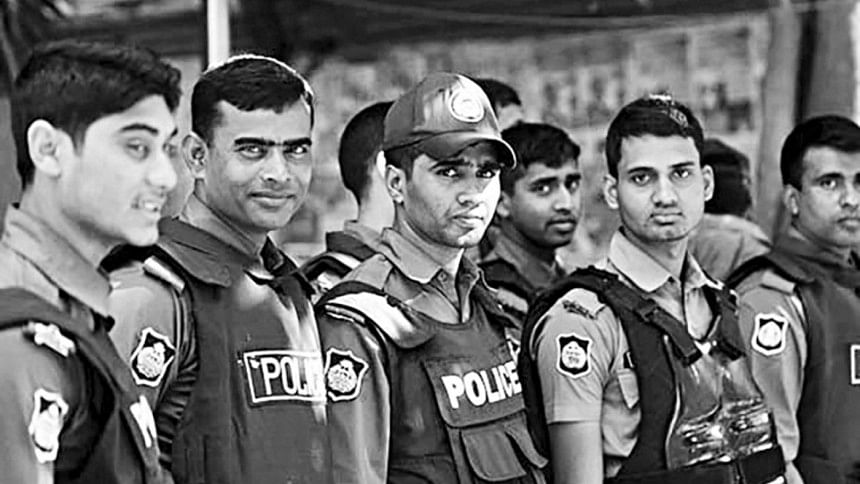POLICE RECRUITMENT: The worrisome abdication of power

It was quite surprising to read the report that some senior police officers had proposed the suspension of their regulatory powers of recruiting constables and to repose the same in Police Headquarters for ensuring central recruitment, during the course of the observance of Police Week 2018. Such a proposition to renounce statutorily delegated power, quite clearly, runs against the time-honoured practice, and one could say, the human instinct to secure power and authority. There is a feeling that this move has perhaps not been prompted by professional interests.
According to unconfirmed reports, some superintendents feel reduced at the dilution of their effective recruiting authority caused by the increasingly disturbing extra-departmental intervention in the recruitment process. Reportedly, this extra-departmental quarter, being politically blessed, insists on recruiting their own candidates who, it is suspected, have handsomely greased the palms of such influence peddlers. As a result, undesirable candidates are being recruited with the Superintendent of Police, the regulation-mandated appointing authority, remaining a helpless onlooker.
In such a scenario, according to sources, some frustrated officers have resorted to the desperate move of proposing to renounce their inherent authority. By all accounts, this is a distressing spectacle. In response to the proposition, the Inspector General has very justifiably said that since the proposal requires regulation change, nothing can be done about it at this point of time.
Whether such a change is required may be debatable. However, the fact remains that one has to take a deep look into the suspected irregularities in the recruitment process of this vital organ of the State with all its attendant effects on the criminal justice administration of the country.
Looking back, one would find that during the period between 1991 and 2006, that is, during the terms of governments by the two major parties, bulk recruitments were affected despite the reservation of senior professionals in the department. The demands of the so-called emerging political requirements had to be met. In the process, ill-trained personnel were produced.
News about the unsavoury political influence on several layers of police hierarchy in the national newspapers was no surprise in the past. In fact, many senior police officers made specific mention of the pernicious political pressures being exerted on them with regard to appointments, transfers, and postings of different ranks.
These officials had also complained about the recruitment of undesirable and unsuitable individuals and inappropriate posting, violating the usual procedure and disregarding the chain of command.
Upon scrutiny, it appears that the political executives did not realise that the police as a State organ was expected to be the relief-provider. They had ensured the entry of undesirable persons in exchange for material favours without appreciating the fact that appointees from a shady deal would turn into bitter and insensitive cops.
Under circumstances like these, it is only natural that bitter individuals occupying positions of power would behave abnormally. Such individuals remained preoccupied with the compulsion of recouping their initial investment at the earliest possible time. Quite naturally, the lure of the lucre took its toll.
The tragedy in the enforcement parlance has been that the real interests of the State were allowed to get diluted and mixed up with the interests of the government of the day. Our politicians including those in the top positions of the State did not display an understanding or appreciation of its requirements and that of the government in a democratic and pluralist society.
Their myopia decimated professionalism and consequently, the sense of direction was lost. In such circumstances, the police hierarchy dipped further into a frustratingly lackadaisical scenario, and the interests of the State took a back seat, providing increasingly greater space to narrow partisan considerations.
In effect, we may have to appreciate that the responsibility for failure to improve the standards of police recruitment and training must fall squarely on both the politicians and the police professionals. They have not adequately risen to the occasion, but that does not mean that the unhealthy practice should continue to the detriment of public service.
Under the circumstances, recruitment standards must be improved by strictly curbing corrupt practices at the time of recruitment. Officers with a record of commendable honesty and integrity should be entrusted with the responsibility of conducting recruitment. This is important because the crux of good policing is the efficient and amiable presence of a well-qualified, trained and motivated constable. The need is to change training programmes from isolated, closed rigidities to integrated, interdisciplinary programmes for the preparation of sensitive enforcement professionals.
Since the method and system of recruitment of constables do not show any fault, the superintendents should remain the effective appointing authority as in the regulation. Passing the buck upwards is no solution.
Muhammad Nurul Huda is a former IGP and a columnist at The Daily Star.

 For all latest news, follow The Daily Star's Google News channel.
For all latest news, follow The Daily Star's Google News channel. 



Comments